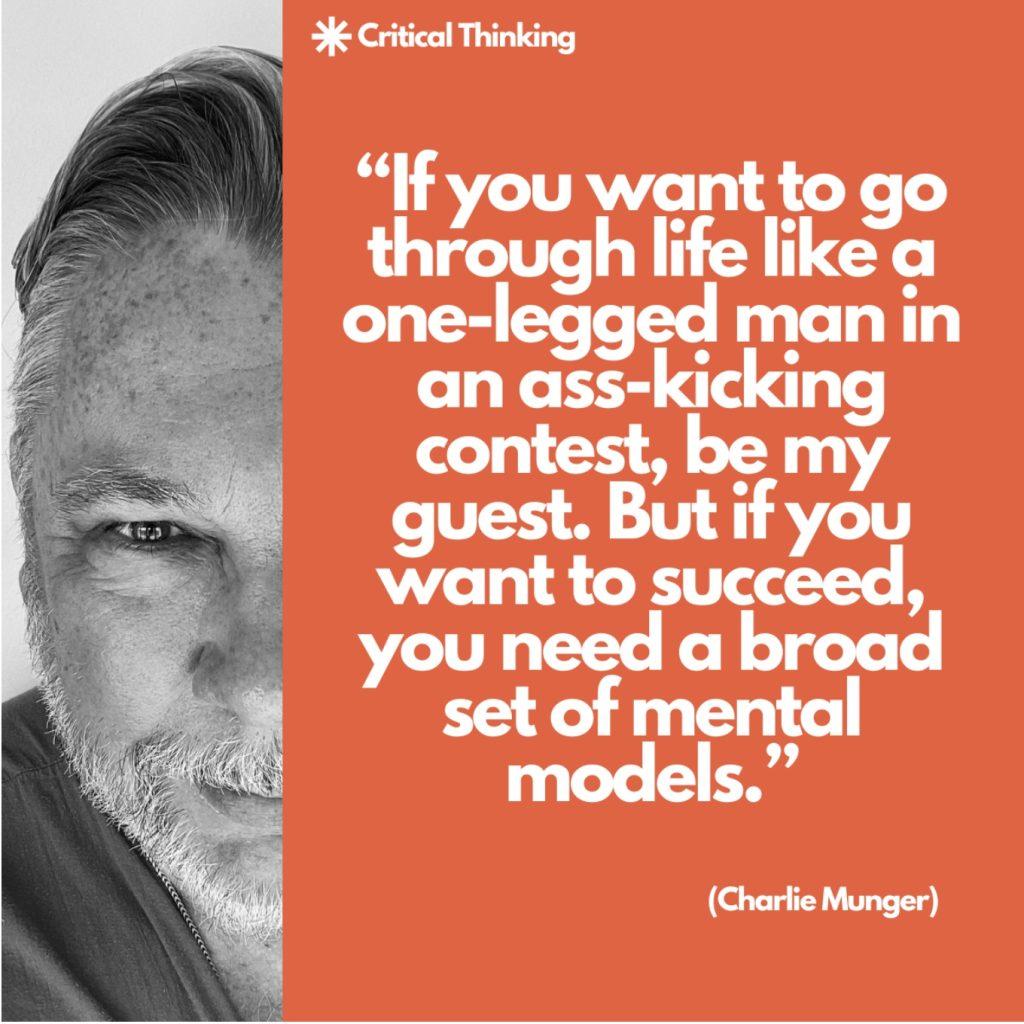By
Simon Crawford Welch, PhD

In an era flooded with data, disruption, and decisions made at the speed of a click, critical thinking has become the most underappreciated superpower in business. While most leaders chase trends or rely on instinct, Charlie Munger, who was Warren Buffett’s right-hand man at Berkshire Hathaway, championed a slower, more rigorous approach rooted in rationality, mental models, and multidisciplinary thinking.
Munger’s ideas may not dominate TikTok, but they are quietly powering some of the most successful companies in the world. His philosophy isn’t just relevant – it’s essential for any business leader seeking long-term success in a world riddled with noise and complexity.
The Foundation: A Latticework of Mental Models
At the heart of Munger’s critical thinking framework is the concept of mental models – essentially, frameworks for understanding how the world works. These models come from a variety of disciplines – psychology, economics, physics, biology – and together form what Munger called a “latticework” of understanding.
This isn’t just academic. In today’s business world, siloed thinking leads to blind spots. Companies that fail to understand human behavior (psychology), network effects (math and economics), or system dynamics (physics) are vulnerable to disruption. Munger’s approach forces executives to cross traditional boundaries and think more holistically.
Take Jeff Bezos, for example. In his 2010 shareholder letter, Bezos emphasized the importance of “long-term thinking” and “customer obsession” – principles that stem directly from Munger’s models of delayed gratification and inversion. Bezos has repeatedly acknowledged the influence of Munger and Buffett on his decision-making philosophy.
The Power of Inversion
Munger once said, “Invert, always invert.” It’s not a fortune-cookie mantra – it’s a powerful cognitive tool.
Inversion means thinking backward. Instead of asking, “How can I succeed?” ask, “What would cause me to fail?” This shift in thinking is deceptively simple but incredibly clarifying. It strips away ego and forces leaders to confront risk, failure modes, and hidden assumptions.
For example, Netflix CEO Reed Hastings applied inversion when he pivoted away from DVD rentals to streaming. Instead of just chasing new growth, he asked: “What would put us out of business?” The answer: digital delivery. So, Netflix disrupted itself before competitors could.
In a fast-paced world, forward-thinking is common. Backward thinking? That’s where the gold is.
The Psychology of Misjudgment
A major part of Munger’s critical thinking toolkit is understanding human bias. He gave a now-legendary talk titled “The Psychology of Human Misjudgment,” where he outlined over 20 cognitive biases that derail rational thought – confirmation bias, authority bias, incentive-caused bias, and many others.
Understanding these biases isn’t optional in leadership – it’s vital. Think of the Theranos debacle. Had more people been trained to spot authority bias (being dazzled by impressive founders) or social proof (everyone else is investing, so I should too), billions might have been saved.
Great CEOs are aware of these traps. Take Elon Musk. For all his eccentricity, Musk frequently talks about *“first principles thinking”—*a mental model rooted in physics that strips away assumptions and asks, “What do we know to be absolutely true?” That’s Munger 101.
Or consider Satya Nadella at Microsoft. When he took over, he didn’t just make strategic shifts – he made mental shifts. He introduced a growth mindset culture (from Carol Dweck’s psychology model), acknowledged cognitive rigidity within the company, and dismantled the toxic zero-sum thinking that had stalled innovation. That’s textbook Munger: applying psychology, systems thinking, and humility to decision-making.
Circle of Competence
Another pillar of Munger’s philosophy is knowing the boundaries of your own knowledge. He calls this the “circle of competence,” and the idea is simple: stick to what you understand, and don’t pretend otherwise.
Munger cautioned: “It’s not a competency if you don’t know the edge of it.”
Too many leaders fall prey to overconfidence bias – venturing into markets, technologies, or strategies they barely grasp. Munger teaches that humility is not weakness; it’s wisdom. This idea is particularly relevant in the age of AI, crypto, and Web3, where executives often feel pressured to “keep up” without fully understanding the mechanics.
CEOs like Tim Cook exemplify this. Cook didn’t try to become Steve Jobs 2.0. Instead, he doubled down on what he understood deeply: operational excellence, supply chain optimization, and disciplined scaling. Apple’s growth under Cook wasn’t flashy innovation – it was brilliant execution within a clearly defined circle of competence.
Checklist Thinking: A Low-Tech Advantage
Munger also advocated for “checklist thinking.” This isn’t flashy – but it’s profoundly effective. The idea: for any complex decision, have a repeatable process. Use checklists to avoid missing key variables.
Atul Gawande, a surgeon and author of The Checklist Manifesto, brought this approach into medicine, but it applies to business just as well. At Berkshire Hathaway, every investment decision goes through a checklist that includes questions about the durability of a company’s moat, the integrity of management, and the simplicity of the business model.
Why does this matter in 2025? Because speed is not the same as clarity. In a world obsessed with moving fast, checklist thinking forces deliberate, high-quality decisions. Think of how many bad acquisitions could be avoided if boards slowed down and ran a Munger-style checklist before signing the dotted line.
Slow Thinking in a Fast World
We live in the age of hot takes and hustle. Everyone wants to move fast and break things. But Munger’s wisdom is a counterweight: move slowly and understand things.
In Munger’s own words:
“The wise man looks for what he can’t see and questions what everyone else takes for granted.”
Critical thinking isn’t about appearing smart in a boardroom. It’s about building systems that last, making decisions that compound, and avoiding the mistakes that destroy companies.
Berkshire Hathaway famously avoided the 2008 financial collapse by steering clear of complex derivatives they didn’t understand. Why? Because Munger and Buffett used first principles, avoided herd mentality, and stayed within their circle of competence. That’s critical thinking in action – and it saved billions.
Thinking Is a Competitive Advantage
Charlie Munger didn’t write bestselling books or build a social media empire – but he built something far more powerful: a mental operating system that has stood the test of time.
In a world where flashy ideas rise and fall by the hour, Munger’s philosophy remains grounded, adaptable, and brutally effective.
Great CEOs – from Bezos to Musk, from Nadella to Cook – aren’t just charismatic leaders. They are thinkers. They build mental moats before market moats. They invert problems, respect the limits of their knowledge, and protect their judgment from bias.
As Munger said:
“Spend each day trying to be a little wiser than you were when you woke up. Discharge your duties faithfully and well. Step by step you get ahead, but not necessarily in fast spurts.”
In a business world drunk on speed, Charlie Munger’s philosophy is the quiet sobriety that more leaders need.
Simon Crawford-Welch, PhD, is the Founder, The Critical Thought Lab. Author of “American Chasms: Essays on the Divided States of America” & “The Wisdom of Pooh: Timeless Insights for Success & Happiness” (Available on Amazon) www.linkedin.com/in/simoncrawfordwelch



